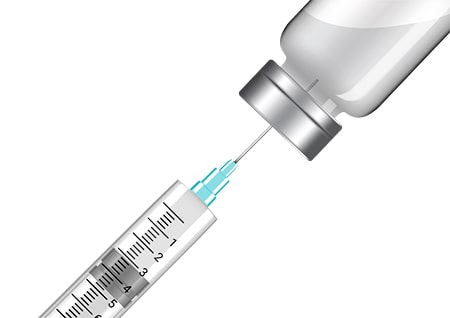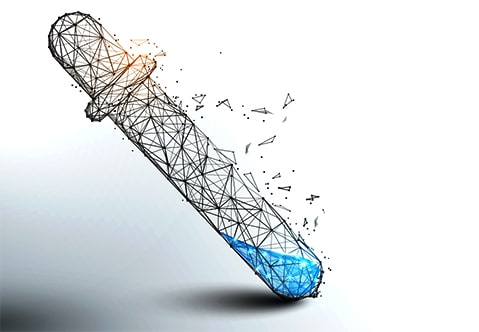Patent waiver on vaccines
 A patent right is an absolute right given for an invention of a product or process which will proscribe others from utilizing, distributing or retailing the product without the consent of the owner. The patent protection is subjected under the TRIPS agreement. The patent holders have the prerogative to manufacture, sell, and use the vaccine for the entire term of 20 years from the date of the filing of the patent. Such protection could give wider accessibility to vaccines. Today the patent right on vaccine takes prominence, as the world tussle with Covid-19. The vaccines that have been developed for the battle against the Covid-19 provide a silver lining to the catastrophe.
A patent right is an absolute right given for an invention of a product or process which will proscribe others from utilizing, distributing or retailing the product without the consent of the owner. The patent protection is subjected under the TRIPS agreement. The patent holders have the prerogative to manufacture, sell, and use the vaccine for the entire term of 20 years from the date of the filing of the patent. Such protection could give wider accessibility to vaccines. Today the patent right on vaccine takes prominence, as the world tussle with Covid-19. The vaccines that have been developed for the battle against the Covid-19 provide a silver lining to the catastrophe.
It is in this context that the joint manifesto of India and South Africa at the WTO for a short-term waiver of the Patent rights on Covid-19 vaccines needs to be discussed. The campaign was supported by international organizations including the World Health Organization and by more than 100 countries. The main goal of the joint proposal is to minimize the barriers in producing their own vaccine by the countries, especially for the low-income nations. The high and middle-income countries have the core companies in vaccine manufacturing and their research and development. Most of the companies holding patent right are from these countries and they sell their vaccines to their own government or to the high-middle income nations. This is the main reason that the high income countries were not happy with the proposal. In their opinion, the proposal will clog the availability of vaccines and drugs at affordable prices.
Without granting waiver during public emergencies, the governments can still allow the companies to produce a product without the patent holders’ consent and it is called compulsory licensing. But the nations which are in support of patent waiving state that this process is much more complicated than that of patent right waivers. Most of the nations were not happy with granting the compulsory licenses.
Article IX.3 of the WTO Agreement states that in “exceptional circumstances”, the Ministerial Council may waive an obligation of the WTO Agreement. Article IX.4 of the WTO Agreement states that when granting the waiver the ministerial council will determine the exceptional circumstances justifying their decision and conditions that prompted them for granting the waiver. Once the waiver is granted, the WTO member countries will not be under an obligation, for a short term on Patent associated rights.
Impact of the patent waiver
The covid-19 pandemic is a worldwide health crisis that prompted the WHO to declare this as extraordinary circumstances calling for extraordinary measures. In light of the US's declaration, the European Union stated that they were ready to discuss the proposal, but other high-income countries and Pharmaceutical companies stays against the move of the developing countries. They pointed out that waiving patents will not give an answer to the present emergency situation in the world. Some other strategies should be considered for addressing the real scenario.
The patent rights to COVID-19 immunizations will give the patent holder an exclusive right to manufacture the vaccine. So those with the patent can decide to whom they can sell, distribute etc. There is a very chance by the big shots to utilize the crisis to yield gain and reputation to their company.
Supply chain
 The vaccines should be made in extremely controlled and high-tech facilities which are not present across the globe. This indicates that the few nations will not be able to produce their own vaccines. The pharmaceutical companies like Modena, Pfizer and BioNTech should take good steps to transfer the technology to manufacturing sites all throughout the planet. A need to build out manufacturing capacity worldwide is required for safe and effective vaccines. Unless vaccines are around the world open to everybody, there will consistently be a danger of a COVID variation that makes antibodies ineffectual making all the efforts in vain. The nations which are having surplus vaccines that are not required for the present may distribute those surpluses with the countries who are in need of the vaccine for their present need. This may be regarded as an apt solution for the worldwide crisis during this pandemic era than waiving the patent right.
The vaccines should be made in extremely controlled and high-tech facilities which are not present across the globe. This indicates that the few nations will not be able to produce their own vaccines. The pharmaceutical companies like Modena, Pfizer and BioNTech should take good steps to transfer the technology to manufacturing sites all throughout the planet. A need to build out manufacturing capacity worldwide is required for safe and effective vaccines. Unless vaccines are around the world open to everybody, there will consistently be a danger of a COVID variation that makes antibodies ineffectual making all the efforts in vain. The nations which are having surplus vaccines that are not required for the present may distribute those surpluses with the countries who are in need of the vaccine for their present need. This may be regarded as an apt solution for the worldwide crisis during this pandemic era than waiving the patent right.
Infrastructure
The approval to manufacture has to satisfy the required infrastructure for the capacity to manufacture the vaccine. The latter requires a significant degree of knowledge, experience and innovative framework for earning clean and safe vaccines. The manufacturing skill in regard to the vaccines using mRNA technology is significantly more expensive and complex than that for the established vector vaccines. These require high tech facilities for preparation and storage as the vaccines and drugs produced are very sensitive. Most of the vaccines are extremely sensitive to temperature fluctuations and they require a steady temperature of up to -80° Celsius and should be stored at the same temperature. Because of these interesting difficulties of manufacturing COVID-19 vaccines, the patent waiver alone will not help inexperienced hands to produce safe vaccines.
Research and development
Another risk limitation of patent right protection is the intricacy in the advancement of drugs. The awful part is that even if we invest billions of money for the research and development of a vaccine there is no guarantee of success. In a worst case scenario, the billions invested may be lost. The companies look forward for the final result to their research to cover up the losses that occurred during the initial phase. After the end of the waiver of patent rights for short term the imitators and conventional manufacturers will get profited from the original inventor's fundamental research work. Also the waiver will not accelerate vaccine manufacturing as there is the short supply of materials and this might take several years to build up capacity from nothing.
Alternatives
A waiver on the patent rights is not a suitable means of enhancing the global supply of vaccines in the short term. A removal of patent protection will have health risks from vaccines that were not expertly prepared and have a chance of political risks in the form of uncertainty. This will cause a negative impact to the pharmaceutical industry on their financial and innovative strength. So it is better to support the existing companies and expand their production capacities. The companies who have found the vaccine can share their license and ideas of research with other reputed companies of similar infrastructure. Certain companies like Astra Zeneca have shared their innovative idea with other companies so that vaccines can be manufactured at various sites. Likewise, an expansion of existing products can be done by entering into partnerships.
Waiver of patent protection as a nightmare
A waiver on the patent initiated by the government could discourage pharmaceutical companies from taking on the costly research and development required to deliver essential drugs in the future. The Pharmaceutical companies would have to fear that they would not be able to earn back their risky investment. So instead of waiving the patent right the companies will always look forward to tying up with the equally reputed companies situated in other countries. They will sell or give license for their invention to those companies receiving remuneration. In this way they can recoup the initial investment.
Conclusion
 The patent right on vaccines take importance as the world is troubled by the Covid-19 pandemic. All inventions are under patent protection under the TRIPS agreement. A patent holder has the right to manufacture retail and exploit the vaccine for the entire term of 20 years from the date of the filing of the patent. Waiving of patent right will be for one year or if exceeds the council has to mention the time limit in the description regarding the reasons for the waiver.
The patent right on vaccines take importance as the world is troubled by the Covid-19 pandemic. All inventions are under patent protection under the TRIPS agreement. A patent holder has the right to manufacture retail and exploit the vaccine for the entire term of 20 years from the date of the filing of the patent. Waiving of patent right will be for one year or if exceeds the council has to mention the time limit in the description regarding the reasons for the waiver.
Waiving patent rights is not a suitable means of enhancing the global supply of vaccines in the short term. The patent waiver will discourage pharmaceutical companies to take risks from taking on the costly research and development work required to provide critical medicines in the future. Instead of waiver of patent rights the areas to be focused on are by improving the infrastructure, enhancing the production of the vaccines and distributing vaccines throughout the globe.
All these are done with an aim to irradiate this pandemic. The countries supporting the patent right waiver are asking for the right to develop their own vaccines without having the fear of getting sued for the breach of the patent right. But the whole scenario looks like these countries are asking for charity.
 عربي
عربي
 English
English Русский
Русский 官话
官话 português
português
 Türk
Türk 






























